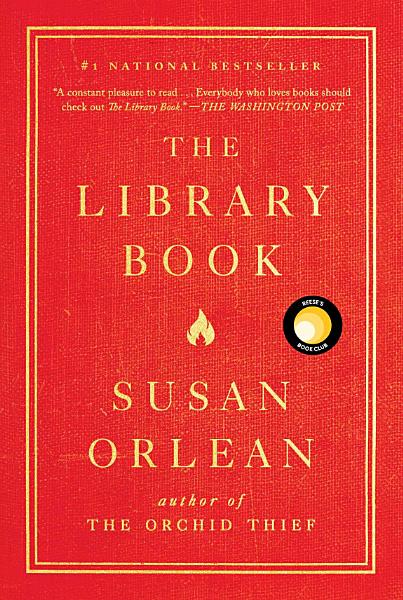But if something you learn or observe or imagine can be set down and save, and if you can see your life reflected in previous lives, and can imagine it in subsequent ones, you can begin to discover order and harmony. You know that you are a part of a larger story that has shape and purpose — a tangible, familiar past and a constantly refreshed future. We are all whispering in a tin can on a string, but we are heard, so we whisper the message into the next tin can and the next string. Writing a book, just like building a library, is an act of sheer defiance. It is a declaration that you believe in the persistence of memory. — The Library Book, Susan Orlean
I’m not one to believe the statement “don’t judge a book by its cover.” In the case of The Library Book, I was immediately drawn to its book design: a bright red cover filled with small ridges that gives the book a rugged feeling and uneven creases on the side that almost makes each page unique when you flip through. But maybe the aforementioned statement about judging books by their covers was inherent in my thinking. After all, a story about a Los Angeles library fire in the 1980’s doesn’t seem like a big deal. I’m sure it burned a couple of books, library workers repaired the burnt texts, construction crew rebuilt the library, then everyone went back to business as usual.
But the book expands the simple story of the devastating library fire into a full fledged adventure as a journalist investigating the lives of the people involved as well as the history of public libraries and the city of Los Angeles. Orlean takes the reader back and forth between times, people, and places, making the story of the fire of the Los Angeles Public Library feel more like an episode of Law and Order than a boring retelling of events.
Against the backdrop of the investigation into the fire, Orlean pauses to highlight profound ideals on the significance of both libraries and books, writing of the importance of libraries as a community center and of the weight of the tragic loss of the texts lost during the library fire. I definitely took my time to read these parts of the book in particular. From my own college experience, I’m sure most students agree that libraries are just places to spend late nights studying, eating junk food, or binging yet another season of The Office.
What I think is often overlooked is the importance of libraries to their respective communities. In the same way I appreciate my college libraries as study spaces, public libraries can serve important roles for social programs. Orlean makes this especially clear in her thorough deep dive into the library history. I was surprised to learn that there are global conferences where library experts meet to discuss what’s new in the library world.
Beyond its role in the community, The Library Book reminds readers of the most important library resources: books. At its core, the library does not simply store a plethora of books, but it holds a collection of stories by different authors, each with a unique voice to tell their perspective of the world around them. I found some of Orlean’s most beautiful writing to be when she describes the value and power behind storytelling. She emphasizes that when that Los Angeles library burned, the irreversible damage on its books left a lasting gap in the human pursuit of knowledge, as those voices were silenced within the raging fire.
I am glad that I was not merely distracted by the peculiar book cover of Orlean’s book, ultimately digging through the details of the story behind such a consequential event as the Los Angeles library fire. And maybe in the same way, through a thorough exploration of all it has to offer my community, I will find new ways to value my local library.
